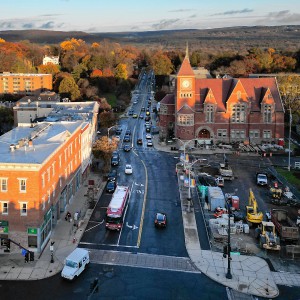In 2023, Hampshire County received almost $1 million from the settlement payments of pharmaceutical companies and drug distributors involved in the opioid crisis. While Amherst received upward of $162,000 in fiscal year 2023, the town has yet to spend any of it. No Hampshire County municipality has spent its share of the settlement money yet, many struggling with restrictive financial regulations and opting to first collect residents’ ideas for the funds.
“You have to balance the importance of getting the money out in a way that’s going to make a difference,” Kiko Malin, Amherst public health director, said. She acknowledged that some advocates are frustrated by the pace of spending decisions. But “if you just rush to spend the money without hearing from the people most impacted,” she said, “then you could really go in the wrong direction.”
Many communities have been working with regional coalition Hampshire HOPE to survey residents’ desires and ideas for how the funds, which are being distributed to all Massachusetts municipalities, can be used to bolster harm reduction and recovery resources. Using the survey results, set to be analyzed starting in May, Amherst hopes to have a multi-year strategic plan in place by the end of June, according to Malin.
Malin and her harm reduction partners have already identified uses for some of the funds, including making Narcan and overdose kits publicly accessible and supplying CRESS responders during their community calls.
The social services organization Craig’s Doors is an ideal access point in expanding harm reduction supplies and education in Amherst because it serves many community members, Malin said. As such, it has been involved in many conversations with the town and Hampshire HOPE to see how the funding can be used to strengthen and expand efforts already underway at their sites.
Craig’s Doors harm reduction coordinator Jack Myers said that key projects include increasing the access, availability and training for Narcan and overdose kits for both staff and those using Craig’s Doors services. In addition, they are looking to expand the used needle disposal system, so that individuals can always dispose of needles in a way that is free, safe, convenient and discreet.
Myers emphasized that as the opioid settlement funds continue to be dispensed over the next decade, upholding the funds’ mission — expanding harm reduction and recovery resources — includes efforts to deconstruct negative and harmful stereotypes about drug use.
Accessibility to these resources is not just limited by dollar amounts but also the pervasive stigma that surrounds drug use. According to Myers, accessibility includes “mak[ing] sure that people don’t feel ashamed to take Narcan or don’t feel ashamed to say they’d like a Narcan training for someone in their life.”
In the weeks to come, public health departments, Hampshire HOPE and community advocates are all focused on getting the survey out to a broad and representative number of county residents.
“Our job is to get that survey into the hands of people who will give us the right information specifically, people who use drugs, people in recovery, the families of folks who use drugs or who’ve been lost to overdose. [We] really want to hear those voices of the people most impacted by the crisis,” Malin said.
The funds, set to be distributed annually until 2038, are a result of 2021 settlements between state attorney generals and drugmakers and opioid distributors who had been sued for actively perpetuating the opioid crisis. Massachusetts will receive $525 million, 60% of which will be directed to the state’s Opioid Recovery and Remediation Fund, while 40% will be directly provided to municipalities.
The funds were originally deposited in municipalities’ general revenue fund, which requires money to be appropriated in order to be spent and which risks unspent funds becoming free cash at the end of the year. The Massachusetts Department of Revenue has since made adjustments that allow municipalities to place the money in a special revenue account.
Amherst was initially able to create a special revenue fund for their allotment and was spared these complications, noted Malin. Many other municipalities chose to set up a revolving fund, and subsequently could not access their funds.
Additionally, the funding arrived in July, September, and November of 2022, a timeline which did not align with the FY23 budget planning cycle for many towns. Hadley and Palmer identified this as a barrier in their expenditure reports.
The settlements are a unique funding situation, going directly to individual municipalities and in specialized, individual amounts. The towns of Chesterfield and Westhampton, for example, received only $7,430 and $8,815 this year, in comparison to Northampton and Amherst which received $239,024 and $162,539, respectively.
“A question we get a lot from smaller communities, who are just getting a few thousand dollars, is ‘What can we do with this? What is actually going to be meaningful?’” Taylor McAndrew, Hampshire HOPE coordinator, said.
Smaller municipalities may not have the same administrative organization to coordinate a targeted response with the funds. Granby’s expenditure report notes that the town is seeking to partner with another community as “the Town lacks the expertise in developing programs to expend these funds.”
Communities can pool their funds together, which McAndrew anticipates will lessen these barriers. She hopes that the survey will illuminate areas for collaboration, such as having multiple towns identify transportation to medical facilities as a primary concern, which would make it possible for them to allocate their collective funds to a transportation program.
“It comes down to capacity. Every community in Massachusetts has their own board of health. Local government is set up uniquely — sometimes you have a mayor, sometimes you have a town administrator, sometimes you have a select board,” McAndrew said. “So, it’s been really interesting, sometimes challenging, but not insurmountable.”















